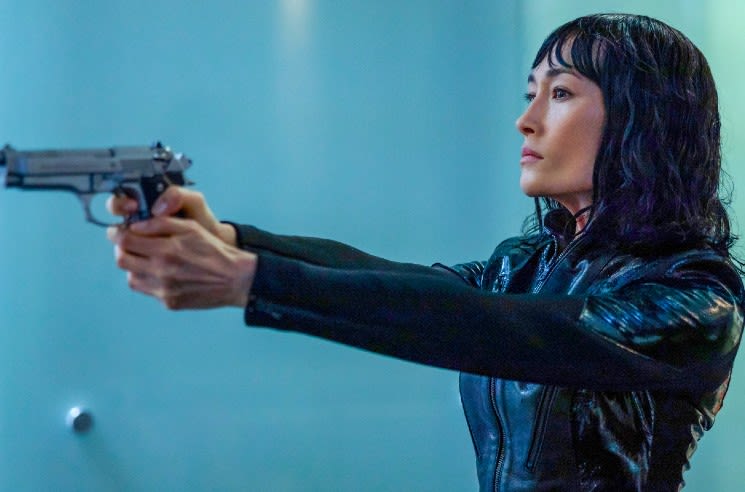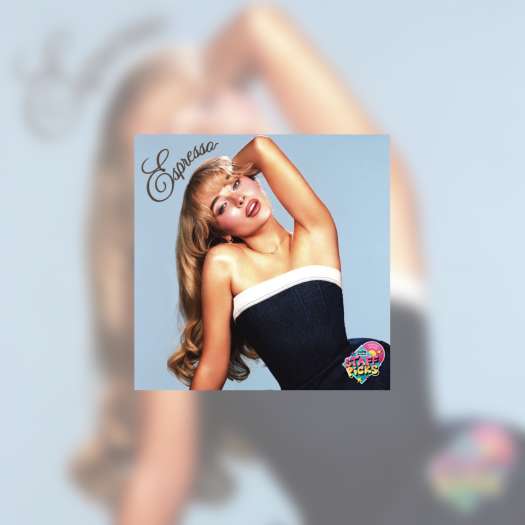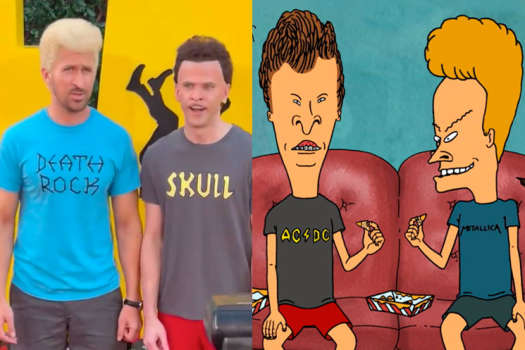The Protégé could have worked: the Martin Campbell-directed (Casino Royale, Goldeneye) film has got the trappings of a modern, trenchant action flick with heart. But there's something about this Richard Wenk-written story that rings hollow to the point of being perfunctorily modern (think 2004 Oscar-bait Crash), hinting toward a social awareness it doesn't actually have. The Protégé squanders any potential it has of being trenchant or poignant through poor narrative choices and ill-cast leads, making for a movie that is fun to watch but meaningless and forgettable.
The film begins in early '90s Vietnam with Samuel L. Jackson's Moody, a hired assassin, rescuing a young Anna (Maggie Q). Anna has killed Moody's hits (a group of local army men who slaughtered Anna's Russian father, Vietnamese mother and siblings in front of her, and kidnapped her) in self-defence. Moody takes Anna from Vietnam to London, and raises her to be a contract killer like him. In present-day London, Anna now carries out hits alongside her surrogate-father Moody. One day, Anna finds Moody brutally murdered, apparently by someone for whom he completed a job in the '90s, and she commits herself to avenging his death. Her mission takes her back to Vietnam, a place she's not been since her family was butchered. Michael Keaton's Rembrandt shows up along the way as love interest and adversary to Anna, working for the group that murdered Moody.
The plot has potential, but somehow in Wenk and Campbell's hands, it becomes stale and boring. Anna has a tragic backstory, but the way she is written as an adult is too perfect, too well adjusted, not haunted enough by her past. Moody is a good wise-old-man character who Jackson plays with gusto, but this isn't a character to write home about. The good and bad guys' motives are clear, but they're not compelling or convincing. And Keaton as Rembrandt is a strange choice.
Q is a good actor, but not good enough to carry an action movie. Anna is an endlessly interesting character — one expects her to be fueled by a strong conviction and drive to fight for what is right because of her family's murder, or to be as joyfully reckless as the blasé Moody, but she's none of these things. Present-day Anna is a cipher, cool and stoic and preternaturally wise, she doesn't have a blaze behind her eyes. Q does a passing job, wearing Anna's unabashedly and refreshingly feminine demeanor with ease and comfort, but if you compare Q's portrayal to an Angelina Jolie character like Evelyn Salt in Salt (2010), Anna pales. Jolie as Evelyn smuggled the character's emotional backstory into every scene, in the flicker of her teary, piercing gaze or in the cracking of her screams. Q as Anna is too glassy, not emotionally captivating enough, and it's difficult to tell if this is because Q isn't able to helm an action movie, or if because the character's white male creators didn't know how to write her well. Anna is written flat as the cinematic accessory that is the Bond girl, not meaty as a lead character ought to be, as though the movie forgot that this is a girl who's lived a tragic life.
Furthermore, Q's Anna doesn't have the warm rapport with Moody that the script tries to sell us on. One would expect an intuitive, balletic relationship between the two, who have presumably been inseparable since Moody rescued her, but there's no molten affection between them. Watching Anna and Moody interact is like watching two people who were recently assigned to be coworkers moving about each other; they're amiable, but not familial, as they ought to be. Jackson as Moody is good, but again, he's just a supporting character, and his portrayal, though done well and with glee, is not enough to carry the film.
Keaton's Rembrandt is the most curious element of the film by virtue of his misplacement. Keaton plays the flippant adversary well, but it's confusing as to why he's made a romantic interest. There is no chemistry between Anna and Rembrandt, though we're meant to believe that there is electric lust exploding between the two as they try to kill each other.
Aside from the lacklustre characters and their dry portrayals, The Protégé is also a showcase of why maybe you might need women in the writing room. Q as Anna is virtually the only woman on screen for the majority of the film, and every male character wastes no time in commenting on her physical appearance — they call her beautiful again and again, but there is no whip-smart response written into Anna, she doesn't respond to these remarks at all, not with action or words. It would be too charitable to say that the film wants these comments about Anna's appearance to be read as poignant commentary on how women are treated in action movies, because they don't serve to showcase Anna's depth, for she is a husk of a character who hasn't been fleshed out. The film also seems to want to comment on America's part in Vietnam's fate, but it can't seem to articulate it, like it doesn't know the history it's based on. It notes, for example, that Anna is half-Russian, but doesn't say why this is noteworthy.
The Protégé is all gestures without deep understanding of what it's talking about, like the white boy in a first-year philosophy lecture who keeps saying fluffy, meaningless words. At the end of the day, no amount of good acting can save a hollow plot and shoddy world building. The Protégé is a vague, boring movie that is forgettable and meatless.
(Lionsgate)The film begins in early '90s Vietnam with Samuel L. Jackson's Moody, a hired assassin, rescuing a young Anna (Maggie Q). Anna has killed Moody's hits (a group of local army men who slaughtered Anna's Russian father, Vietnamese mother and siblings in front of her, and kidnapped her) in self-defence. Moody takes Anna from Vietnam to London, and raises her to be a contract killer like him. In present-day London, Anna now carries out hits alongside her surrogate-father Moody. One day, Anna finds Moody brutally murdered, apparently by someone for whom he completed a job in the '90s, and she commits herself to avenging his death. Her mission takes her back to Vietnam, a place she's not been since her family was butchered. Michael Keaton's Rembrandt shows up along the way as love interest and adversary to Anna, working for the group that murdered Moody.
The plot has potential, but somehow in Wenk and Campbell's hands, it becomes stale and boring. Anna has a tragic backstory, but the way she is written as an adult is too perfect, too well adjusted, not haunted enough by her past. Moody is a good wise-old-man character who Jackson plays with gusto, but this isn't a character to write home about. The good and bad guys' motives are clear, but they're not compelling or convincing. And Keaton as Rembrandt is a strange choice.
Q is a good actor, but not good enough to carry an action movie. Anna is an endlessly interesting character — one expects her to be fueled by a strong conviction and drive to fight for what is right because of her family's murder, or to be as joyfully reckless as the blasé Moody, but she's none of these things. Present-day Anna is a cipher, cool and stoic and preternaturally wise, she doesn't have a blaze behind her eyes. Q does a passing job, wearing Anna's unabashedly and refreshingly feminine demeanor with ease and comfort, but if you compare Q's portrayal to an Angelina Jolie character like Evelyn Salt in Salt (2010), Anna pales. Jolie as Evelyn smuggled the character's emotional backstory into every scene, in the flicker of her teary, piercing gaze or in the cracking of her screams. Q as Anna is too glassy, not emotionally captivating enough, and it's difficult to tell if this is because Q isn't able to helm an action movie, or if because the character's white male creators didn't know how to write her well. Anna is written flat as the cinematic accessory that is the Bond girl, not meaty as a lead character ought to be, as though the movie forgot that this is a girl who's lived a tragic life.
Furthermore, Q's Anna doesn't have the warm rapport with Moody that the script tries to sell us on. One would expect an intuitive, balletic relationship between the two, who have presumably been inseparable since Moody rescued her, but there's no molten affection between them. Watching Anna and Moody interact is like watching two people who were recently assigned to be coworkers moving about each other; they're amiable, but not familial, as they ought to be. Jackson as Moody is good, but again, he's just a supporting character, and his portrayal, though done well and with glee, is not enough to carry the film.
Keaton's Rembrandt is the most curious element of the film by virtue of his misplacement. Keaton plays the flippant adversary well, but it's confusing as to why he's made a romantic interest. There is no chemistry between Anna and Rembrandt, though we're meant to believe that there is electric lust exploding between the two as they try to kill each other.
Aside from the lacklustre characters and their dry portrayals, The Protégé is also a showcase of why maybe you might need women in the writing room. Q as Anna is virtually the only woman on screen for the majority of the film, and every male character wastes no time in commenting on her physical appearance — they call her beautiful again and again, but there is no whip-smart response written into Anna, she doesn't respond to these remarks at all, not with action or words. It would be too charitable to say that the film wants these comments about Anna's appearance to be read as poignant commentary on how women are treated in action movies, because they don't serve to showcase Anna's depth, for she is a husk of a character who hasn't been fleshed out. The film also seems to want to comment on America's part in Vietnam's fate, but it can't seem to articulate it, like it doesn't know the history it's based on. It notes, for example, that Anna is half-Russian, but doesn't say why this is noteworthy.
The Protégé is all gestures without deep understanding of what it's talking about, like the white boy in a first-year philosophy lecture who keeps saying fluffy, meaningless words. At the end of the day, no amount of good acting can save a hollow plot and shoddy world building. The Protégé is a vague, boring movie that is forgettable and meatless.




